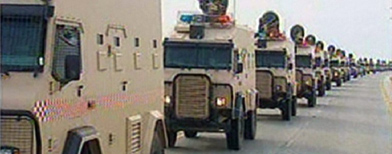 Security forces with tanks have overrun a square in the centre of Bahrain's capital Manama where anti-government protesters have been camped for weeks.
Security forces with tanks have overrun a square in the centre of Bahrain's capital Manama where anti-government protesters have been camped for weeks.
Two people are reported to have died after police fired tear gas at the mainly Shia demonstrators, who have been calling for political reform.
The country's Sunni rulers have declared martial law and called in Saudi troops to help keep order.
At least two people died in clashes on Tuesday and more than 200 were injured.
It is not clear whether soldiers from other Gulf states are taking part in the crackdown alongside Bahraini forces.
The BBC's Caroline Hawley in Manama says black plumes of smoke are rising over Pearl Square, the centre of the protests, while helicopters are flying overhead. There are riot police stationed in approach roads.
Armoured vehicles moved in shortly after dawn, our correspondent says, and the security forces now appear to have full control of the square.
Hospital surrounded
The crackdown comes a day after King Hamad Bin Isa Al Khalifa declared a three-month state of emergency.
Protesters had set up barricades in the square but they were no match for the military, our correspondent says.
Tyres were burnt to alert people in surrounding villages to the crackdown but they were unable to make it through to the square to join the protests.
The security forces have now moved into Manama's financial district, reopening roads which had been blocked by protesters.
The country's stock market said it had closed until further notice, AFP news agency said.
Sources at the Salmaniya hospital say it is surrounded by troops, and no-one is being allowed in or out. The wounded are now reportedly being treated in mosques.
Human rights groups reported the two latest deaths, and said live rounds had been used in some parts of the city.
Bahrain - home to the US Navy's Fifth Fleet - is the first Gulf country to be thrown into turmoil by the wave of unrest sweeping the Arab world.
The protests in Bahrain - which has a population of 525,000 - began last month. The Shia majority complain of economic hardship, lack of political freedom and discrimination in jobs in favour of Sunnis.
Seven people had been killed during a month of protests prior to Tuesday's clashes.
The king reshuffled his cabinet on 26 February, replacing four ministers, including two royal family members. However, he did not sack Prime Minister Sheikh Khalifah ibn Salman al-Khalifah, who has held the office for more than 40 years.
The protesters were inspired by the recent uprisings in Tunisia and Egypt, whose long-serving presidents were forced from power after weeks of demonstrations.
The UN, US and other countries have called for restraint and a political resolution to the crisis.
But our correspondent says the prospect of dialogue recedes with every shot fired.



